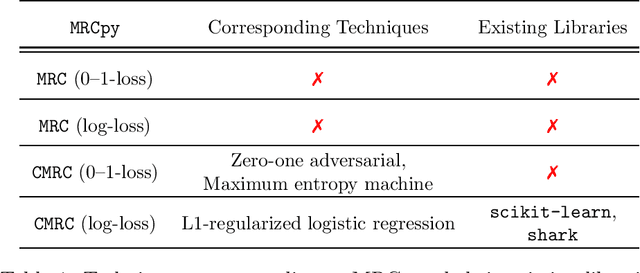Kartheek Bondugula
Efficient Learning of Minimax Risk Classifiers in High Dimensions
Jun 11, 2023Abstract:High-dimensional data is common in multiple areas, such as health care and genomics, where the number of features can be tens of thousands. In such scenarios, the large number of features often leads to inefficient learning. Constraint generation methods have recently enabled efficient learning of L1-regularized support vector machines (SVMs). In this paper, we leverage such methods to obtain an efficient learning algorithm for the recently proposed minimax risk classifiers (MRCs). The proposed iterative algorithm also provides a sequence of worst-case error probabilities and performs feature selection. Experiments on multiple high-dimensional datasets show that the proposed algorithm is efficient in high-dimensional scenarios. In addition, the worst-case error probability provides useful information about the classifier performance, and the features selected by the algorithm are competitive with the state-of-the-art.
MRCpy: A Library for Minimax Risk Classifiers
Aug 04, 2021
Abstract:Existing libraries for supervised classification implement techniques that are based on empirical risk minimization and utilize surrogate losses. We present MRCpy library that implements minimax risk classifiers (MRCs) that are based on robust risk minimization and can utilize 0-1-loss. Such techniques give rise to a manifold of classification methods that can provide tight bounds on the expected loss. MRCpy provides a unified interface for different variants of MRCs and follows the standards of popular Python libraries. The presented library also provides implementation for popular techniques that can be seen as MRCs such as L1-regularized logistic regression, zero-one adversarial, and maximum entropy machines. In addition, MRCpy implements recent feature mappings such as Fourier, ReLU, and threshold features. The library is designed with an object-oriented approach that facilitates collaborators and users.
 Add to Chrome
Add to Chrome Add to Firefox
Add to Firefox Add to Edge
Add to Edge